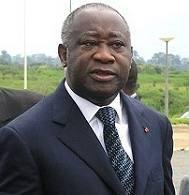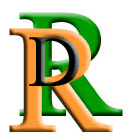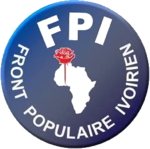
Koudou Laurent Gbagbo is an Ivorian politician who was the President of Côte d'Ivoire from 2000 until his arrest in April 2011. A historian, Gbagbo was imprisoned in the early 1970s and again in the early 1990s, and he lived in exile in France during much of the 1980s as a result of his union activism. Gbagbo founded the Ivorian Popular Front (FPI) in 1982 and ran unsuccessfully for president against Félix Houphouët-Boigny at the start of multi-party politics in 1990. He won a seat in the National Assembly of Côte d'Ivoire in 1990.

The Democratic Party of Côte d'Ivoire — African Democratic Rally is a political party in Côte d'Ivoire.

The Rally of the Republicans is a liberal party in Ivory Coast. The party is the country's governing party; the party's leader, Alassane Ouattara, is the current President of Ivory Coast.

The First Ivorian Civil War was a conflict in the Ivory Coast that began in 2002. Although most of the fighting ended by late 2004, the country remained split in two, with a rebel-held Muslim north and a government-held Christian south. Hostility increased and raids on foreign troops and civilians rose. As of 2006, the region was tense, and many said the UN and the French military failed to calm the civil war.

The Ivorian Popular Front is a centre-left, democratic socialist and social democratic political party in Ivory Coast.
The Movement of the Forces of the Future is a political party in Côte d'Ivoire. The MFA was founded by Innocent Anaky in December 1992.

Guillaume Kigbafori Soro is an Ivorian politician who was the Prime Minister of Côte d'Ivoire from April 2007 to March 2012. Prior to his service as Prime Minister, Soro led the Patriotic Movement of Côte d'Ivoire, and later the New Forces as its Secretary-General. Since March 2012, Soro has been President of the National Assembly of Côte d'Ivoire.

Simone Ehivet Gbagbo is an Ivorian politician. She is the President of the Parliamentary Group of the Ivorian Popular Front (FPI) and is a Vice-President of the FPI. As the wife of Laurent Gbagbo, the President of Côte d'Ivoire from 2000 to 2011, she was also First Lady of Ivory Coast prior to their arrest by pro-Ouattara forces.

Presidential elections were held in Ivory Coast in 2010. The first round was held on 31 October, and a second round, in which President Laurent Gbagbo faced opposition leader Alassane Ouattara, was held on 28 November 2010. Originally scheduled to be held in 2005, the vote was delayed several times due to the Ivorian Civil War and difficulties involved in the organization and preparation of the elections. A peace agreement between the government and the former rebel New Forces was signed on 4 March 2007, and in late April 2009, it was announced that the elections would be held by 6 December 2009, and that the date would be announced shortly. On 15 May 2009, the date was announced to be 29 November 2009. On 11 November, the elections were postponed again due to delays in the electoral roll. It was announced on 3 December 2009 to be held in late February or early March 2010.

A parliamentary election was held in Ivory Coast on 11 December 2011, after the presidential election which was held in late 2010. This followed a peace agreement between the government and the New Forces that was signed in March 2007. The Rally of the Republicans, the party of President Alassane Ouattara, won just under half the seats in the National Assembly.

Presidential elections were held in Ivory Coast on 22 October 2000. Robert Guéï, who headed a transitional military regime following the December 1999 coup d'état, stood as a candidate in the election. All of the major opposition candidates except for Laurent Gbagbo of the Ivorian Popular Front (FPI) were barred from standing. The Rally of the Republicans (RDR) and Democratic Party of Côte d'Ivoire – African Democratic Rally (PDCI-RCA) boycotted the election in response to the exclusion of their candidates by the Supreme Court.
Émile Boga Doudou was an Ivorian politician who served as Minister of State for the Interior and Decentralization from 2000 to 2002. He was killed in the failed coup attempt that marked the start of the Ivorian Civil War.

Presidential elections were held in Ivory Coast on 25 October 2015. Alassane Ouattara won a second term in a landslide victory over his closest rival Pascal Affi N'Guessan.

The Rally of Houphouëtists for Democracy and Peace is a political alliance in Ivory Coast.

A constitutional referendum was held in Ivory Coast on 30 October 2016. Voters were asked whether they approve of a proposed new constitution. The new constitution would create a Senate, remove the nationality clause from the presidential requirements and establish the post of Vice-President. The constitution was approved by 93.42% of votes with a 42.42% turnout, as announced by the president of the Independent Electoral Commission (CEI).

The Vice President of the Republic of Ivory Coast, officially the Republic of Côte d'Ivoire, is the second-highest executive official in Ivory Coast. The Vice President, together with the President of Ivory Coast, is directly elected by the people through popular vote to serve a five-year term of office. The Vice President is the first person in the presidential line of succession and would ascend to the presidency upon the death or resignation of the President, or an absolute vacancy in the office. President Alassane Ouattara appointed Daniel Kablan Duncan as Vice President in January 2017 after the 2016 Constitution was enacted.














